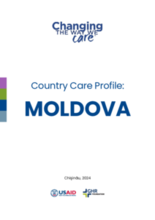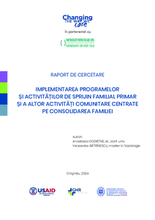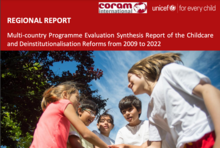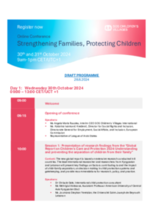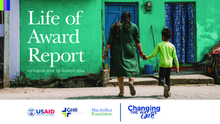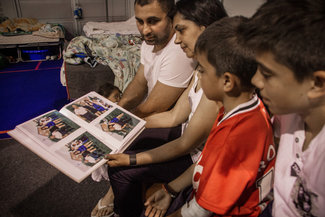

Displaying 51 - 60 of 1074
A turning point in the campaign to close Romania’s dungeon-like orphanages and cruel homes for the disabled came with the shutting of Camin Spital, a grim block near the Ukrainian border with bars on the windows to stop people from jumping to their deaths.
This country care profile provides an overview of key lessons learned in the children’s care reform process in Moldova, including successes, challenges and areas for progress, and gaps in learning and best practice.
Studiul sociologic „Implementarea programelor și activităților de sprijin familial primar și a altor activități comunitare centrate pe consolidarea familiei” este un prim studiu realizat în Republica Moldova, cu scopul cartografierii programelor și a activităților de sprijin primar existente prin evaluarea relevanței, a eficienței, durabilității, dificultăților și a bunelor practici. Rezultatele cercetării au informat elaborarea conceptului și procesul pilotării unui model eficientizat de sprijin primar al familiilor cu copii. Modelul eficientizat al serviciului urmează să consolideze acțiunile viitoare ale actorilor comunitari în sprijinirea familiilor pentru a putea depăși situațiile de risc.
This report presents the main findings, conclusions, and recommendations of an evaluation of the child care and deinstitutionalisation reforms in seven countries in the Europe and Central Asia Region (Bulgaria, Georgia, Moldova, Montenegro, Northern Macedonia, Serbia and Tajikistan). The report offers valuable insights into the effectiveness of child protection systems and the transition from institutional care to family- and community-based alternatives. It highlights key achievements, lessons learned, and best practices, while also addressing the areas where further improvements are needed to ensure that every child can grow up in a nurturing, safe, and supportive environment.
Panama, Uganda, Sri Lanka and Czech Republic among those newly committing to totally prohibit violence against under-18s.
Dr. Stefania Ilinca of the World Health Organization highlights the importance of nurturing family care, especially for younger children, and the need to ensure early childhood intervention and disability services are accessible at the community level.
Since joining the European Union in 2007, Bulgaria has sought to make changes in its child welfare system for children raised in care institutions around the country. According to UNICEF, in 2021 there were 10,000 children living in alternative care in Bulgaria - most of them were ethnic Roma or children with disabilities. This is the story of how Bulgaria Without Orphans has played a role in Bulgaria's care reform.
The Changing the Way We Care℠ (CTWWC) Life of the Award Report highlights the initiative’s global efforts to promote safe, nurturing family care for children. Since 2018, CTWWC has been driving care reform in countries like Guatemala, Kenya, and Moldova, while supporting smaller projects in Haiti and India.
Bune Practici de Asistență Parentală Profesionistă pentru Copiii cu Nevoi Complexe: Rezultatele analizei preliminare a literaturii de specialitate pentru pregătirea proiectului pilot privind asistența parentală profesionistă specializată în Republica Moldova rezumă cele mai bune practici internaționale în domeniul asistenței parentale profesioniste specializate, și oferă perspective și recomandări esențiale pentru dezvoltarea și extinderea asistenței parentale profesioniste specializate în Republica Moldova.

